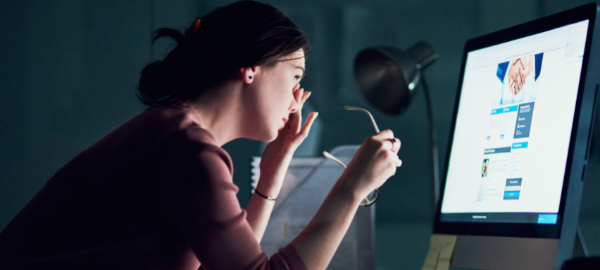What Are Blue Light Glasses?
Ask our dispensing optician
Your request was successfully submitted!

Reviewed by
Beck Jinnette
Have you ever finished your gaming session or work day with tired and irritated eyes?
In today’s digital era, our lives are intricately intertwined with screens, from smartphones and laptops to tablets and e-readers.
As we navigate this digital landscape, we often overlook the potential implications of prolonged screen exposure on our eye health and overall well-being.
That’s where blue light-blocking glasses step in, offering a potential solution to the problems caused by blue light emitted from digital devices.
What is blue light?
Blue light refers to a specific range of electromagnetic radiation within the visible light spectrum.
Blue light rays are at the high end of the visible light spectrum and have the shortest yet most powerful wavelength (380-460nm).
Blue light waves are the closest to invisible waves and ultraviolet rays, which are known to be the most dangerous of all light waves.
Because of its higher energy, blue light is more likely to scatter in the atmosphere, which is why the sky appears blue during the day.
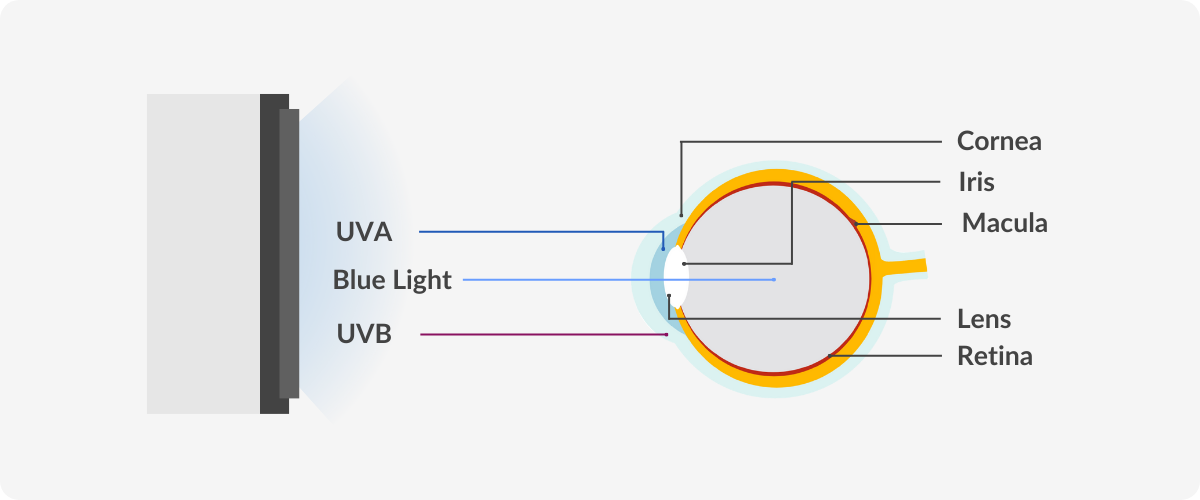
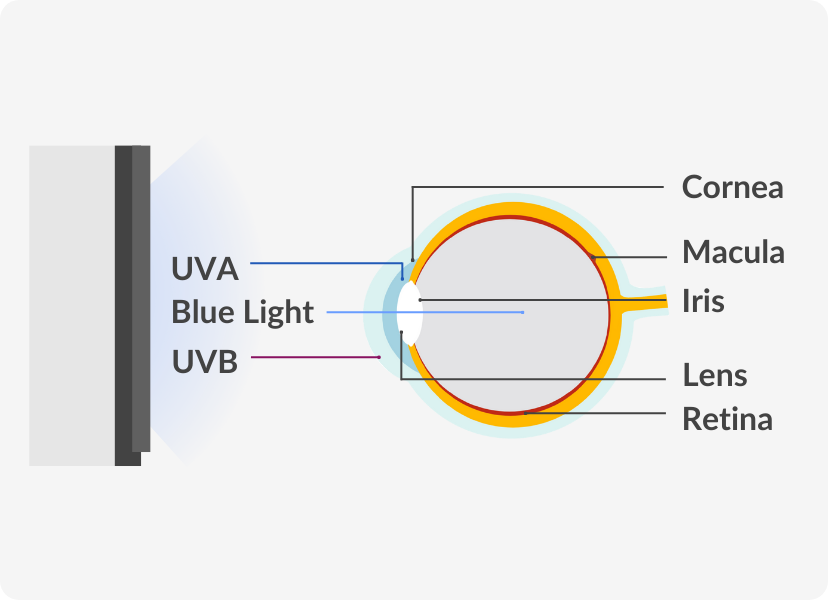
So is blue light harmful?
It’s important to note that not all blue light is harmful. Blue light is present naturally in sunlight (largest source of blue light) and plays a crucial role in regulating our circadian rhythms.
The primary concern arises from excessive exposure to artificial sources of blue light, particularly from digital devices, LED lighting and energy-efficient light bulbs.
Therefore, it is best to be safe and protect your eyes from blue light with a pair of blue light-blocking glasses.
The purpose of blue light glasses
The primary purpose of blue light-blocking glasses is to reduce digital eye strain and discomfort caused by digital devices (that emit blue light).
When we spend long hours in front of computers, smartphones, tablets or other electronic screens, we expose our eyes to higher levels of blue light than what they would naturally encounter from daylight.
Symptoms of digital eye strain (also known as computer vision syndrome) may include eye fatigue, dry eye syndrome, blurry vision, headaches, discomfort in the neck and shoulders and difficulty falling asleep.
Blue light-blocking glasses work by selectively blocking or filtering out a portion of the blue light spectrum, aiming to reduce these potential negative effects.
By wearing blue light-filtering glasses, some individuals report experiencing less eye strain and improved comfort while using a digital device for extended periods.
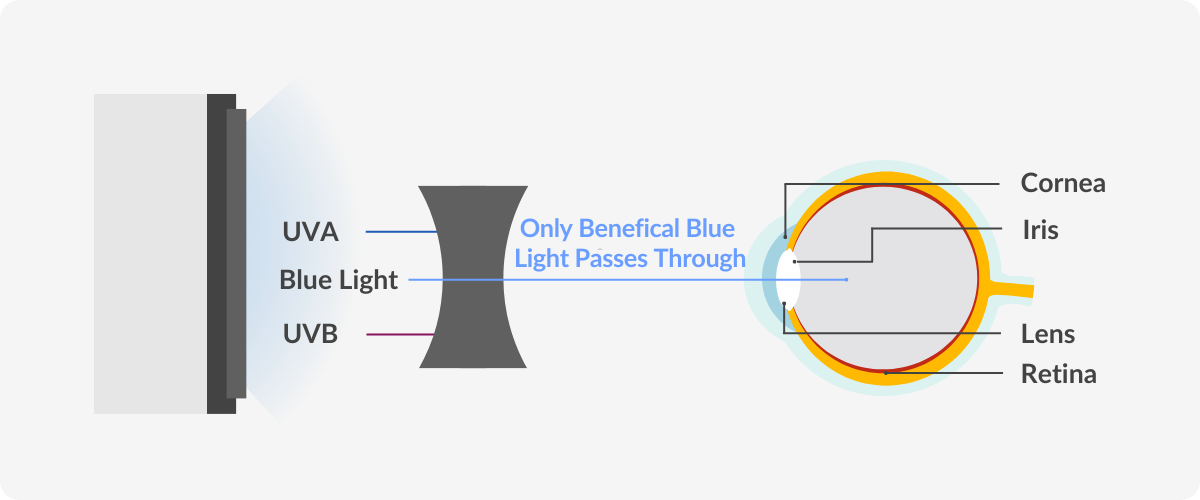
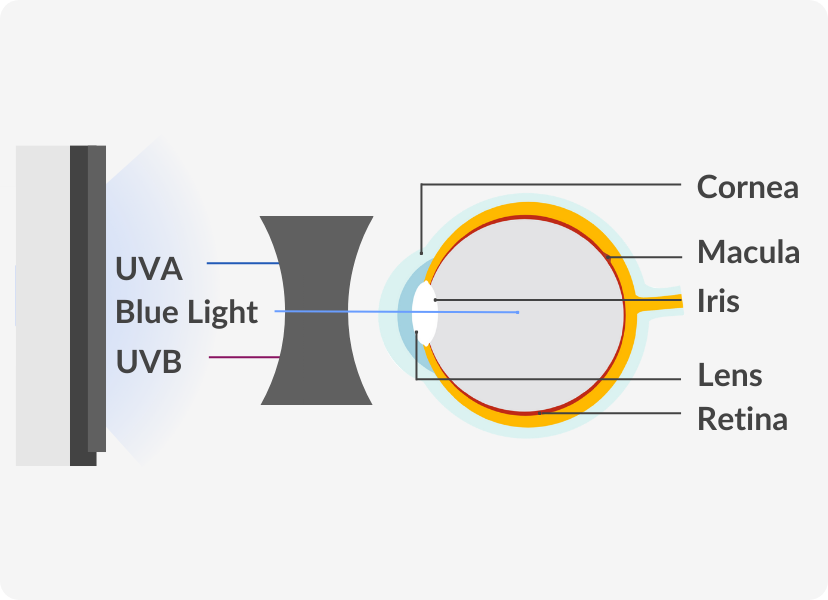
DID YOU KNOW?
The most common symptoms of the negative effects of blue light are: eye fatigue, dry eyes, blurry vision, headaches and discomfort in the neck and shoulders.
What are the benefits of blue light glasses?
Blue light-blocking glasses are designed to mitigate the potential negative effects of excessive blue light exposure from digital screens.
While the scientific evidence supporting their benefits is still evolving, many users who wear plano and prescription glasses with a blue light filter report experiencing some positive results.
Reduced eye strain
Prolonged screen time can lead to digital eye strain, which may cause symptoms like dry eyes, blurred vision, headaches and eye discomfort.
Blue light-blocking glasses can help reduce eye strain by filtering out a portion of the blue light that contributes to these symptoms.
Improved sleep quality
Blue light exposure, especially during the evening or nighttime, can suppress the production of melatonin, a hormone that regulates sleep.
Wearing glasses that block blue light in the evening or using devices with blue light filters can help maintain the body’s natural circadian rhythms and improve sleep patterns.
Enhanced comfort
People often report feeling more comfortable when using a computer screen and other devices while wearing blue light glasses, as the glasses can help reduce the harsh glare and intensity of screens.
Potential retinal protection
Some studies suggest that excessive exposure to blue light, particularly high-energy blue-violet light, might contribute to retinal damage over time.
Blue light glasses with specific coatings may offer protection against potential long-term damage, although more research is needed to establish this and other benefits conclusively (Dawnie et al. 2019).
Minimised risk of macular degeneration
Some researchers believe that long-term exposure to blue light could be associated with an increased risk of age-related macular degeneration (AMD) (Zhao et al. 2018).
Wearing blue light glasses might help reduce this risk by limiting the amount of harmful blue light reaching the eyes, safeguarding your macular health.
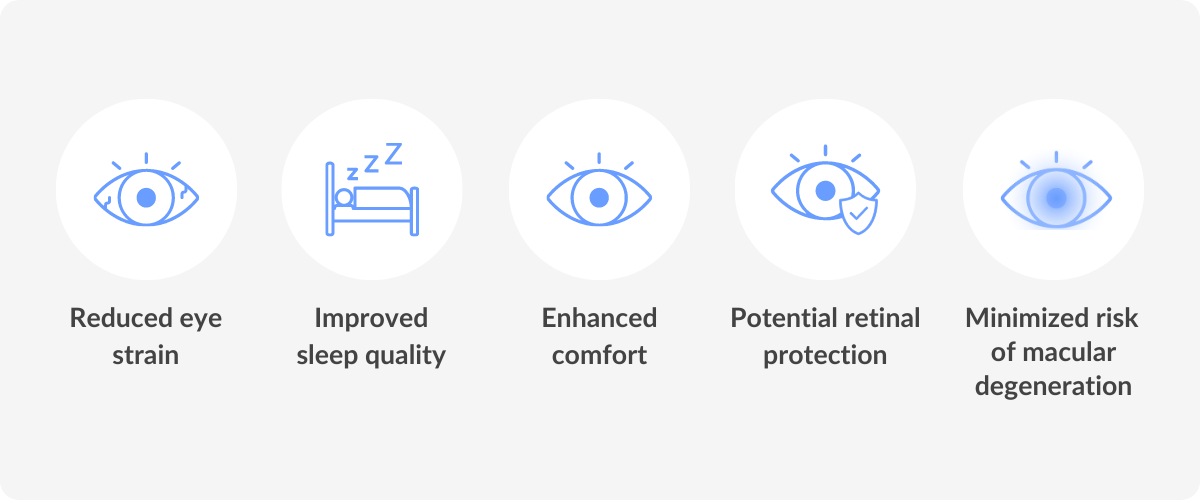
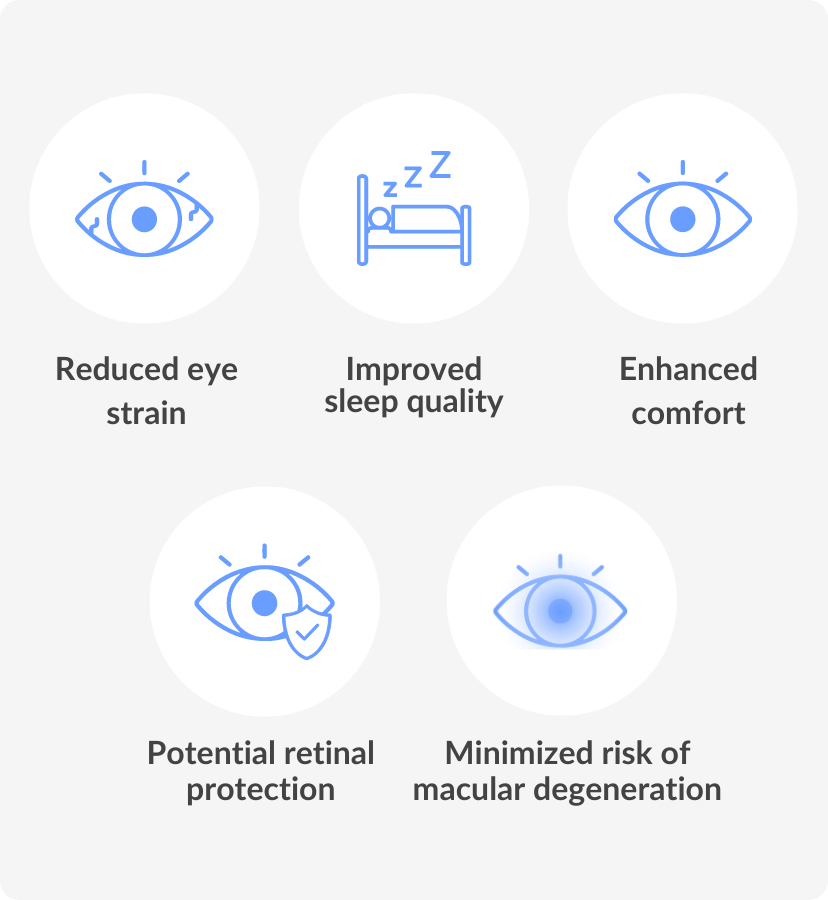
When should you use blue light glasses?
Since blue-blocking glasses filter out possible harmful wavelengths of light, they are best worn in situations where you risk being exposed to too much blue light.
This includes almost all electronic devices with screens – so, whether you’re watching television, checking your phone or working at a computer, blue light-blocking glasses can prevent sleep issues and minimise your risk of eye strain, headaches and difficulty sleeping.
We suggest wearing blue light-filtering glasses:
- On extremely bright, sunny days
- In front of a computer monitor (i.e. when playing video games)
- When using your phone (especially at night)
- When a migraine feels imminent
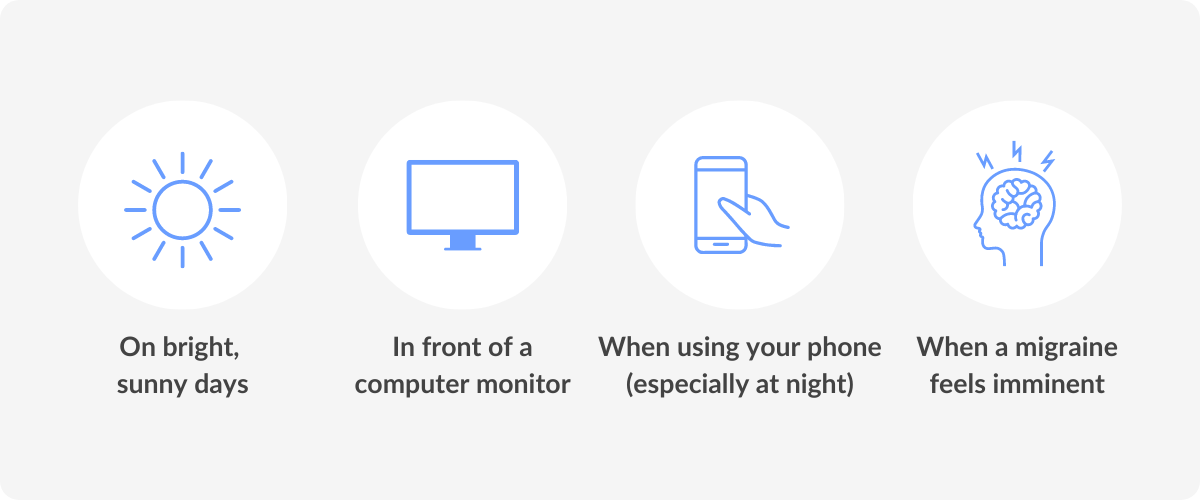
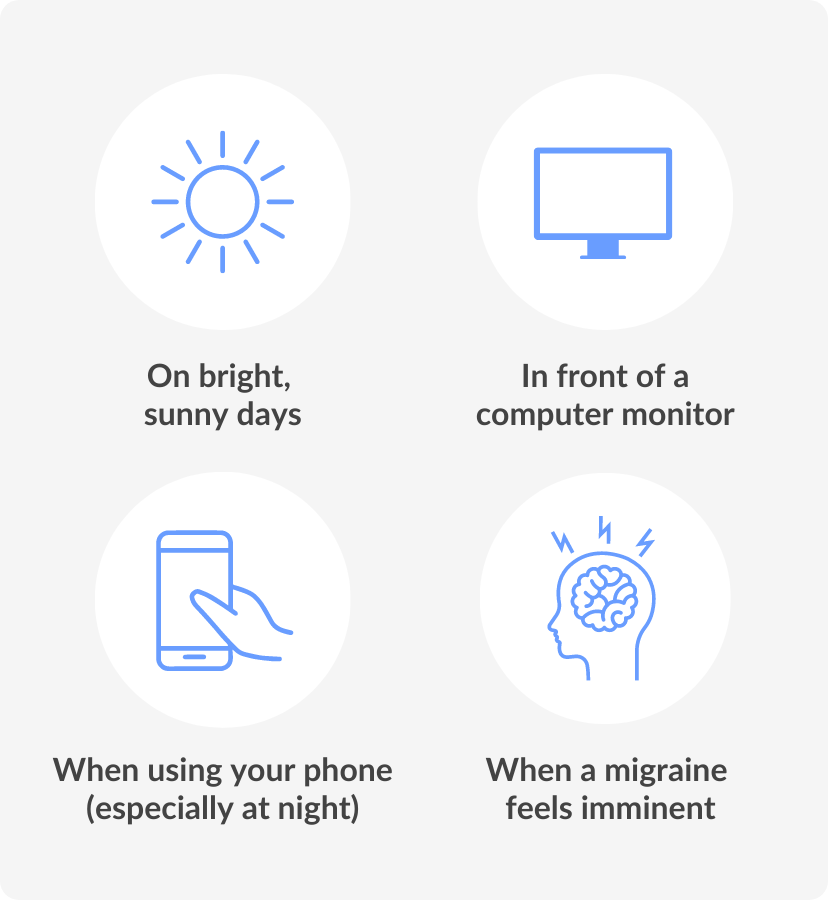
When having long sessions of extended screen time, it is strongly recommended to safeguard your visual performance by taking frequent breaks, wearing computer glasses and making sure the device is at least at arm’s length.
Are blue light glasses really necessary?
If you worry about the impact of blue light on your eyes and sleep patterns, you may consider trying a quality pair of blue light-blocking glasses, especially if you have a lifestyle that involves extensive screen use.
As always, it’s a good idea to consult with an eye care professional to determine the best approach for your specific needs.
References
Downie, L. E., Keller, P. R., Busija, L., Lawrenson, J. G., & Hull, C. C. (2019), Blue‐light filtering spectacle lenses for visual performance, sleep, and macular health in adults. The Cochrane Database of Systematic Reviews, 2019(1), CD013244.
https://doi.org/10.1002/14651858.CD013244
Zhao, Z. C., Zhou, Y., Tan, G., & Li, J. (2018). Research progress about the effect and prevention of blue light on eyes. International journal of ophthalmology, 11(12), 1999–2003.
https://doi.org/10.18240/ijo.2018.12.20







































